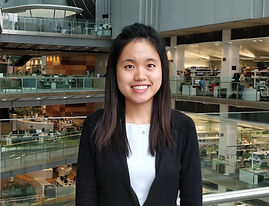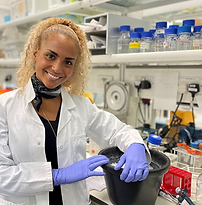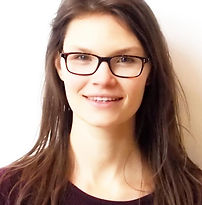What We Do
We organize a range of dynamic entrepreneurship events, such as academic, industrial, and commercial talks, panel discussions, workshops, innovation challenge hackathons, networking sessions, and start-up career fairs. These events aim to showcase the experiences and journeys of both company founders and scientists who have transitioned to careers in innovation, venture capital, or technology transfer.
Who Are We
CSEN consists of a diverse group of early-career scientists from various backgrounds at the Francis Crick Institute. Our enthusiasm lies in sharing insights about entrepreneurship and establishing valuable relationships with start-up founders, investors, and industry partners.
Executive team
Advisory team
Events team
Lizzie Rider
Co-director
Alicja Skwara
Co-director
Partnerships team

Arta Aghaeipour Dehkaei
Director

Neil Rzechorzek
Communications team

Sofia Pavlou
Director

Micaela Sartoretti





ALUMNI
Where are they after CSEN
Isabel Zhang

Isabel works as an early-stage investor at HCVC, a deep-tech fund backing entrepreneurs in Europe and the US, who leverage breakthrough technology to digitize, automate and decarbonize the world. She obtained her PhD in Stem Cell and Developmental Biology at The Francis Crick Institute/UCL in the Briscoe and Lovell-Badge lab, where her research focused on elucidating the gene regulatory and epigenetic mechanisms of neural stem cells during spinal cord development using gene editing and next-generation sequencing. Isabel initiated and dedicated her time, next to her PhD, to build the Crick Science Entrepreneur Network. Additionally, she is one of the founding members and former co-managing director of Nucleate London, a global non-profit life science accelerator. Isabel’s mission is to create an ecosystem that empowers scientists and engineers to translate their research into impactful ventures. Isabel's curiosity about disruptive technologies has also led her to VC fellowships at Foresite Labs and BlueYard Capital.
Laabiah Wasim

Laabiah did her PhD at the Tolar Lab studying survival and growth signalling in B-cell lymphomas using techniques such as genome wide CRISPR screening. She has a strong passion for sparking ideas and engaging in interdisciplinary collaborations with her colleagues. This is one of the reasons she co-organized the Crick Innovation Challenge to give other PhD students a platform to network and collaborate on finding solutions to broader scientific challenges. She’s currently building a biotech company to develop targeted therapeutics in B-cell malignancies like lymphomas and multiple myeloma.
Barry Liu

Barry is a PhD student at the Crick, specializing in structural virology. He was a part of the CSEN events team from 2021 to 2022, where his responsibilities included planning and organizing various events such as workshops and panel discussions. Throughout his tenure, Liu fostered new connections with entrepreneurs and investors, acquiring invaluable insights into the creation of entrepreneurial startups and the translation of science into practical applications.
A notable highlight of his involvement was co-leading the 1st Innovation Challenge hosted by CSEN. This initiative proved to be a testament to the synergy of an exceptional team, transforming a significant challenge into a remarkable success. Through this experience, Liu not only gained extensive experience in event planning but also developed deep friendships with fellow CSEN members through collaborative teamwork.
Currently, Liu has shifted his focus back to his academic research, aiming to complete his thesis. He aspires to leverage his research on virus structures towards the development of vaccines in the future.
Puay Lee

Puay conducted her PhD research on cancer immunoevasion with Prof Adrian Hayday at the Crick. During her PhD, she was a founding member and Partnerships lead of CSEN. She was involved in setting up and organizing a series of panel sessions that hosted start-up founders and VC investors. Puay was also part of the organizing team of the first Crick Innovation Challenge, which saw 50+ participants from across the UK gather for a week-long hackathon session that ended with a business pitching session to investors and industry experts. Currently, Puay is a Life Sciences Specialist at L.E.K. Consulting London where her work contributes to advising biopharma and private equity clients on their business decisions.
Jingkun Zheng

Jingkun completed his PhD under the supervision of John Diffley at the Crick Institute, awarded with a Boehringer Ingelheim Fonds PhD fellowship. His research provided valuable insights into the mechanism of whole genome duplication in cancer and contributed to our understanding of cancer evolution. During his time at CSEN, Jingkun played a key role in founding, designing events, and marketing strategies in the organization’s inaugural year. He is now pursuing postdoctoral research with Jennifer Doudna at UC Berkeley, where he will focus on developing innovative tools with the potential to transform cancer treatment.
Dooa Taha

Doaa is a Postdoctoral Research Scientist at the Crick Institute. She focuses on modelling motor neurone disease using human stem cells. Throughout her PhD and Postdoctoral research, Taha has been investigating the role of glial cells in the progression of motor neurone disease and identifying targets for therapy. She actively participated in CSEN and played a significant role in organising the Crick Innovation Challenge 2022, which targeted early career researchers interested in entrepreneurship in the fields of healthy ageing, biotech outside medicine, laboratory innovation, and data-driven health. Her future work aims to bridge the gap between fundamental discovery science and translation for patient benefit in neurodegenerative diseases by targeting glial cells.




















